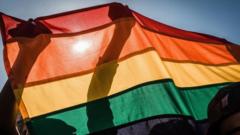In a significant policy shift, the World Bank announced it is terminating its loan ban on Uganda that had been in place since 2021 due to the country’s adoption of stringent laws targeting the LGBTQ community. The decision comes on the heels of Uganda’s passage of some of the world's harshest anti-homosexuality laws in 2023, making certain same-sex acts punishable by death. Following this legislation, many individuals faced evictions, violence, and arrests due to their sexual orientation, as reported by local advocacy groups including Uganda's Human Rights Awareness and Promotion Forum.
World Bank Rescinds Loan Ban: A Step Forward for Uganda?

World Bank Rescinds Loan Ban: A Step Forward for Uganda?
The World Bank has lifted its ban on loans to Uganda, which was instituted in response to the country’s severe anti-LGBTQ legislation.
However, the World Bank expressed confidence in new "mitigation measures" designed to ensure that funding does not negatively impact or discriminate against LGBTQ individuals. A representative indicated, “The World Bank cannot deliver on its mission to end poverty unless all people can participate in and benefit from funded projects." This shift opens the door for new ventures in social protection, education, and refugee assistance, as detailed by another spokesperson for the World Bank.
As a major contributor to Uganda's infrastructure development and a vital source of external finance, the World Bank’s involvement is critical for various projects, including roadway improvements and energy access expansions. Nonetheless, concerns have been raised regarding the funding models employed by the World Bank and the International Monetary Fund, with critics claiming that such systems often perpetuate dependency and hinder genuine economic growth.
The adoption of Uganda’s severe Anti-Homosexuality Act invoked widespread international backlash and reportedly cost the nation between $470 million and $1.7 billion in lost funding opportunities. Supporters of the law argue that it is a reflection of the conservative values held by Ugandans, while detractors assert it serves as a diversion from pressing issues like unemployment and political repression.
"Low-hanging fruit," termed as issues that require less effort to highlight, appears to describe this legislation according to Oryem Nyeko of Human Rights Watch, suggesting the law portrays foreign influences as a threat to societal norms. Witnesses to the violence and discrimination that surged after the law's implementation reveal that the increased hostility towards LGBTQ individuals is a direct result of this legal framework.
Moreover, the law’s stipulation imposing prison sentences for “promoting” homosexuality has been interpreted as a move against advocates for LGBTQ rights, an allegation the Ugandan government refutes. The international community continues to closely monitor the situation in Uganda, with ongoing concerns about the welfare and rights of LGBTQ individuals.
You may also be interested in:
- Human Rights Violations Amid Anti-LGBTQ Crackdowns
- The Economic Impact of Uganda's Anti-Homosexuality Law
- Comparisons of LGBTQ Rights Across African Nations
As a major contributor to Uganda's infrastructure development and a vital source of external finance, the World Bank’s involvement is critical for various projects, including roadway improvements and energy access expansions. Nonetheless, concerns have been raised regarding the funding models employed by the World Bank and the International Monetary Fund, with critics claiming that such systems often perpetuate dependency and hinder genuine economic growth.
The adoption of Uganda’s severe Anti-Homosexuality Act invoked widespread international backlash and reportedly cost the nation between $470 million and $1.7 billion in lost funding opportunities. Supporters of the law argue that it is a reflection of the conservative values held by Ugandans, while detractors assert it serves as a diversion from pressing issues like unemployment and political repression.
"Low-hanging fruit," termed as issues that require less effort to highlight, appears to describe this legislation according to Oryem Nyeko of Human Rights Watch, suggesting the law portrays foreign influences as a threat to societal norms. Witnesses to the violence and discrimination that surged after the law's implementation reveal that the increased hostility towards LGBTQ individuals is a direct result of this legal framework.
Moreover, the law’s stipulation imposing prison sentences for “promoting” homosexuality has been interpreted as a move against advocates for LGBTQ rights, an allegation the Ugandan government refutes. The international community continues to closely monitor the situation in Uganda, with ongoing concerns about the welfare and rights of LGBTQ individuals.
You may also be interested in:
- Human Rights Violations Amid Anti-LGBTQ Crackdowns
- The Economic Impact of Uganda's Anti-Homosexuality Law
- Comparisons of LGBTQ Rights Across African Nations






















